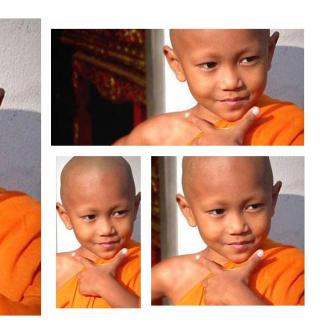Image Generation
2001 papers with code • 85 benchmarks • 67 datasets
Image Generation (synthesis) is the task of generating new images from an existing dataset.
- Unconditional generation refers to generating samples unconditionally from the dataset, i.e. $p(y)$
- Conditional image generation (subtask) refers to generating samples conditionally from the dataset, based on a label, i.e. $p(y|x)$.
In this section, you can find state-of-the-art leaderboards for unconditional generation. For conditional generation, and other types of image generations, refer to the subtasks.
( Image credit: StyleGAN )
Libraries
Use these libraries to find Image Generation models and implementationsDatasets
Subtasks
-
 Image-to-Image Translation
Image-to-Image Translation
-
 Image Inpainting
Image Inpainting
-
 Text-to-Image Generation
Text-to-Image Generation
-
 Conditional Image Generation
Conditional Image Generation
-
 Conditional Image Generation
Conditional Image Generation
-
 Face Generation
Face Generation
-
 3D Generation
3D Generation
-
 Image Harmonization
Image Harmonization
-
 Pose Transfer
Pose Transfer
-
 3D-Aware Image Synthesis
3D-Aware Image Synthesis
-
 Facial Inpainting
Facial Inpainting
-
 Layout-to-Image Generation
Layout-to-Image Generation
-
 ROI-based image generation
ROI-based image generation
-
 Image Generation from Scene Graphs
Image Generation from Scene Graphs
-
 Pose-Guided Image Generation
Pose-Guided Image Generation
-
 User Constrained Thumbnail Generation
User Constrained Thumbnail Generation
-
 Handwritten Word Generation
Handwritten Word Generation
-
 Chinese Landscape Painting Generation
Chinese Landscape Painting Generation
-
 person reposing
person reposing
-
 Infinite Image Generation
Infinite Image Generation
-
 Multi class one-shot image synthesis
Multi class one-shot image synthesis
-
 Single class few-shot image synthesis
Single class few-shot image synthesis
Latest papers with no code
InstantFamily: Masked Attention for Zero-shot Multi-ID Image Generation
Additionally, our masked cross-attention mechanism enables the precise control of multi-ID and composition in the generated images.
Hide and Seek: How Does Watermarking Impact Face Recognition?
The recent progress in generative models has revolutionized the synthesis of highly realistic images, including face images.
Anywhere: A Multi-Agent Framework for Reliable and Diverse Foreground-Conditioned Image Inpainting
In the image generation module, we employ a text-guided canny-to-image generation model to create a template image based on the edge map of the foreground image and language prompts, and an image refiner to produce the outcome by blending the input foreground and the template image.
Autonomous Quality and Hallucination Assessment for Virtual Tissue Staining and Digital Pathology
Here, we present an autonomous quality and hallucination assessment method (termed AQuA), mainly designed for virtual tissue staining, while also being applicable to histochemical staining.
PKU-AIGIQA-4K: A Perceptual Quality Assessment Database for Both Text-to-Image and Image-to-Image AI-Generated Images
This oversight highlights a critical gap in the current research landscape, underscoring the need for dedicated databases catering to image-to-image scenarios, as well as more comprehensive databases that encompass a broader range of AI-generated image scenarios.
Learning Mixtures of Gaussians Using Diffusion Models
We give a new algorithm for learning mixtures of $k$ Gaussians (with identity covariance in $\mathbb{R}^n$) to TV error $\varepsilon$, with quasi-polynomial ($O(n^{\text{poly log}\left(\frac{n+k}{\varepsilon}\right)})$) time and sample complexity, under a minimum weight assumption.
Grounded Compositional and Diverse Text-to-3D with Pretrained Multi-View Diffusion Model
In this paper, we propose an effective two-stage approach named Grounded-Dreamer to generate 3D assets that can accurately follow complex, compositional text prompts while achieving high fidelity by using a pre-trained multi-view diffusion model.
Fisher Information Improved Training-Free Conditional Diffusion Model
Recently, the diffusion model with the training-free methods has succeeded in conditional image generation tasks.
Causal Diffusion Autoencoders: Toward Counterfactual Generation via Diffusion Probabilistic Models
We empirically show that CausalDiffAE learns a disentangled latent space and is capable of generating high-quality counterfactual images.
Trinity Detector:text-assisted and attention mechanisms based spectral fusion for diffusion generation image detection
Artificial Intelligence Generated Content (AIGC) techniques, represented by text-to-image generation, have led to a malicious use of deep forgeries, raising concerns about the trustworthiness of multimedia content.





















































































 CIFAR-10
CIFAR-10
 ImageNet
ImageNet
 CIFAR-100
CIFAR-100
 MNIST
MNIST
 Cityscapes
Cityscapes
 CelebA
CelebA
 Fashion-MNIST
Fashion-MNIST
 CUB-200-2011
CUB-200-2011
 FFHQ
FFHQ
 Oxford 102 Flower
Oxford 102 Flower